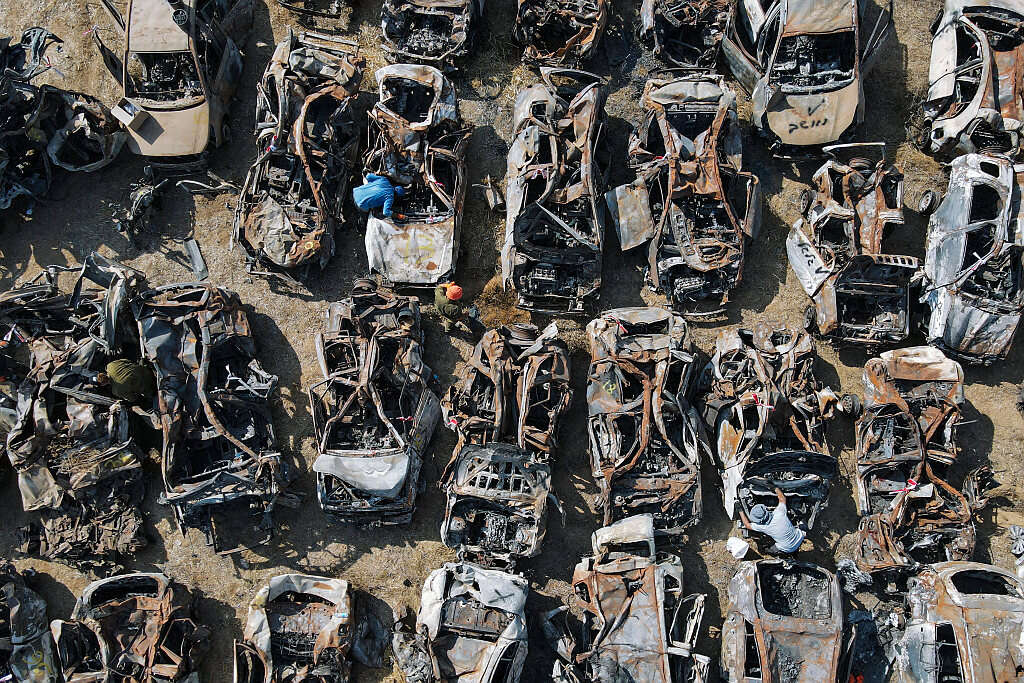Two months ago, Moti Almoz was listening to a radio show when he heard an academic suggest that controlling Gaza's education system could foster a peace-loving society in the strip. Infuriated, Almoz called the station to complain and was invited to share his views on air. His subsequent comments sparked a fierce debate on social media, with opinions sharply divided over the retired general's stance on maintaining an Israeli presence in the Gaza Strip.
"I'd been up since 5 a.m. dealing with irrigation issues and pesticide spraying in the orchards," Almoz recalls. "Then I hear this professor talking about peace agreements, and it set me off. When they asked if we needed to claim territory, I said, 'At this point, we should be harvesting wheat in those border areas.' That really stirred things up."
Q: You're suggesting a civilian presence in the strip. Does this include establishing settlements?
"Settlements are a controversial issue, and we don't need more controversy right now. But agriculture is a good solution that makes a statement. In university, I wrote a paper on sheep herding during the British Mandate period. Those herds served security purposes. And this wasn't in disputed territories, but in central Israel. These are the principles of early settlement, and we need to return to them now. Israel's security doctrine has been based on various strategies, like shifting conflicts to enemy territory and quick, precise wars. It's time for an update."

Almoz argues for a buffer zone of about 2.5 to 6 miles west of the fence under Israeli control. "This depth is critical for protecting our communities. It's been clear since day one that this is necessary. We need to send a clear message: anyone planning future attacks will lose territory. That's what victory looks like, not images of surrendering enemies."
Q: This implies a long-term military presence.
"The children starting school this week will serve in Gaza. That's the reality of our region," Almoz states. He dismisses the idea of quick peace solutions, arguing that Israel must prioritize security over peace negotiations in the short term.
Now 57, Almoz lives in a northern Israeli village with his wife Tali and their five children. After 37 years of service, including roles as head of the Civil Administration in the West Bank, IDF Spokesperson, and head of the Personnel Directorate, he retired as a major general. The day after hanging up his uniform, he was back in work clothes, refurbishing an old tractor to return to farming.
Q: The challenge is fighting in a densely populated civilian area.
"We're preoccupied with terms like 'innocents' and 'uninvolved civilians.' But I ask: What if we hadn't responded until a day after the attack? We saw what happened in the border communities. It wasn't just the armed groups; civilians came to loot, assault, and kill. Young people bragged about killing with their bare hands, even elderly people joined in. There are two million Palestinians in Gaza. If we hadn't stopped them, they would have reached more communities, killing and looting. This calls into question the concept of 'uninvolved civilians.'"
Almoz's perspective, shaped by his extensive military career and current life as a farmer, offers a stark view of the region's future. He acknowledges that his views may be controversial, particularly his skepticism towards peace negotiations. "To anyone speaking about peace with Gaza, I say: consider the risk to your daughter," he warns.
Almoz reflects on the enduring nature of the conflict and the tough choices Israel faces. "This is the area we live in, we'll live by the sword forever," he says, adding with a note of grim determination, "But as they say, it's better to live by the sword than to live in illusions."




